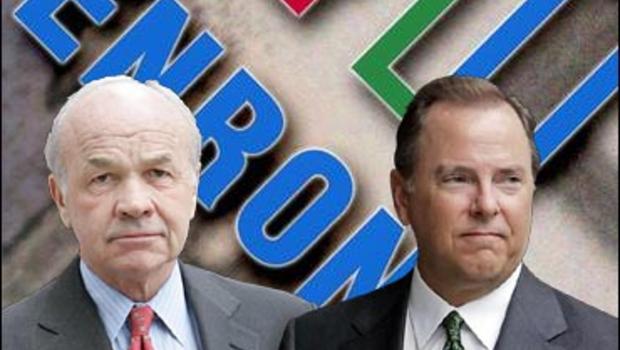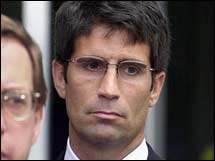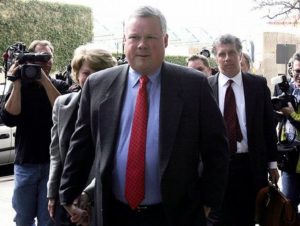 John Emshwiller of the Wall Street Journal ($) weighs in today on the defense strategy of former Enron key executives Ken Lay and Jeff Skilling for their upcoming criminal trial, and he is surprised to find that Lay and Skilling are not conceding the government’s theory that the former executives covered up a financial house of cards at Enron:
John Emshwiller of the Wall Street Journal ($) weighs in today on the defense strategy of former Enron key executives Ken Lay and Jeff Skilling for their upcoming criminal trial, and he is surprised to find that Lay and Skilling are not conceding the government’s theory that the former executives covered up a financial house of cards at Enron:
Four years of investigations and intense news coverage have made Enron a synonym for fraud and sleaze. But when the trial of former top executives Jeffrey Skilling and Kenneth Lay begins Jan. 30, defense lawyers will make a bold argument: Everything their company did was legal.
That approach stands in stark contrast to some other big-name corporate defendants in recent history. Lawyers for former WorldCom Inc. Chief Executive Bernard Ebbers and former HealthSouth Corp. chief Richard Scrushy didn’t dispute that large-scale financial shenanigans had occurred at the companies. They simply argued that their clients didn’t know about the wrongdoing. . .
The government wants to persuade jurors that the case is simply about two rich and powerful men lying to protect their troubled business empire. [Skilling lawyer Daniel] Petrocelli’s task is to show that it wasn’t so simple. The matters at the heart of the government’s indictment involve sophisticated accounting and financial decisions that were fully vetted by Enron’s outside lawyers and auditors, says Mr. Petrocelli.
Read the entire article, which is really one of the best articles about the defense strategy in the case that has appeared in a major newspaper to date. But it’s an interesting dynamic that Mr. Emshwiller — who has covered the Enron scandal from the beginning — thinks that Lay and Skilling’s defense is “audacious.” In point of fact, there is nothing in his article about the Lay-Skilling defense strategy that has not already appeared in the many previous posts about the Enron case on this blog, although I must concede that the WSJ’s readership is a tad larger than that of this modest forum. ;^)
Nevertheless, Emshwiller’s surprise over the defense strategy reinforces just how the conventional Enron story — i.e., that the company was merely a house of cards and that the company’s intrinsic instability was hidden from the investing public by a greedy and deceitful management team — has become engrained in the psyche of American society.
Indeed, as reflected by this discussion over the injustice of what happened to the Merrill Lynch executives in the Nigerian Barge case, many otherwise thoughtful and intelligent people believe that they understand the Enron morality play so thoroughly that they seemingly lose the capacity for independent thought regarding Enron and reject any notion of ambiguity or fair-minded analysis in ferreting out the truth of what really happened at Enron.
It’s better late than never that Emshwiller is providing a fair piece on Lay and Skilling’s story about what happened at Enron. But the shattered lives and companies that result from the witch-hunt mentality of cases such as Enron and Michael Milken is a stark reminder of the enormous societal cost of criminalizing corporate agency costs rather than allowing responsibility for alleged wrongdoing in such cases to be sorted out in a civil context.
Update: Don’t miss Larry Ribstein’s typically insightful comment on the Emshwiller article, which includes the following foreboding observation for the next executives who are subjected to prosecution in the criminalization-of-agency-cost lottery:
But it’s worth noting that future Skillings may not even have the opportunity to mount a defense like this. The CEO of the next Enron that goes down will be criminally prosecuted under SOX section 906 for signing off on financials when they knew, at least in hindsight, there were defective internal controls, whatever that means. I guess after the next $40 million defense (and God knows how much taxpayer money for the prosecution) we’ll find out.
Like this:
Like Loading...
 Following on this earlier profile, the Chronicle’s Mike Tolson provides this extensive profile today of former Enron CEO Jeff Skilling as he gears up for the commencement of the Super Bowl of Enron criminal trials next Monday.
Following on this earlier profile, the Chronicle’s Mike Tolson provides this extensive profile today of former Enron CEO Jeff Skilling as he gears up for the commencement of the Super Bowl of Enron criminal trials next Monday.








